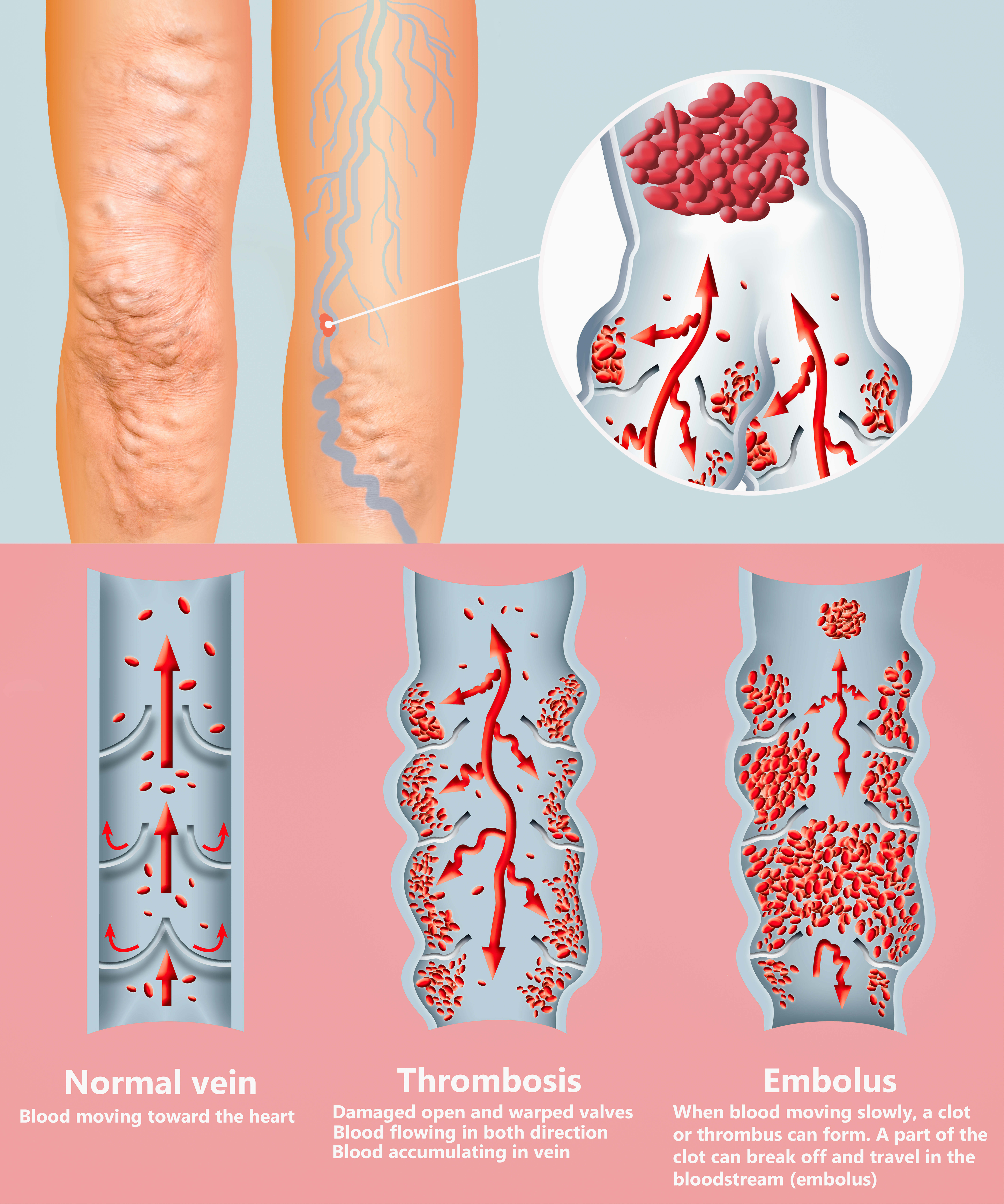
What are Blood Clots?
Blood clots form when blood cells and other substances clump together, creating a gel-like mass in your blood vessels. Typically, blood clotting (coagulation) occurs after an injury to protect you from severe blood loss. After the wound heals, your body dissolves the blood clot. However, medical conditions and diseases can cause coagulation that does not dissolve and can lead to life-threatening health problems.
For example, blood clots that develop in the deep veins in the muscle of your arms and legs lead to deep vein thrombosis (DVT). If clots form in your arteries, become loose, and travel to your lungs, they cause pulmonary embolism (PE). In addition, loose blood clots that travel to your brain can cause a stroke, and ones that travel to your heart can cause a heart attack.
The VeinSolutions teams in Flint, Michigan, and Lapeer, Michigan, can provide in-depth screenings and the correct treatment plan.
What Causes Blood Clots?
Substances in your blood called platelets and fibrin stick together to coagulate and seal injured blood vessels. Platelets are cells made in your bone marrow, and fibrin is a stringy, sticky blood protein. Together, they create a reddish, jelly-like clump held together with fibrin netting.
When you cut yourself and damage a fragile blood vessel, blood clots seal the cut in minutes to prevent blood loss. However, a sedentary lifestyle and certain medical conditions can cause blood flow improperly and increase the risk of blood clots forming in your veins and arteries.
Risk Factors For Developing Blood Clots
Gender
Women have more of the hormone estrogen than men. Estrogen increases the levels of clotting factors. In addition, birth control pills and hormone therapy containing estrogen can increase the risk of blood clots, especially in women who smoke or have a family history of heart conditions.
Age
Those over 55 have a higher risk of developing blood clots. This higher risk is because as we age, our activity level decreases, affecting our blood flow. Furthermore, older adults have higher levels of blood clotting factors called coagulation activation peptides.
Obesity
In addition to an increased risk of stasis (stagnation of blood), obesity leads to chronic inflammation and insulin resistance, which can increase platelet activity. Furthermore, obesity leads to an overproduction of blood clotting activators.
Pregnancy
Pregnancy changes a woman’s body in many ways. To lessen blood loss during labor and delivery, a woman’s blood clumps together more easily while pregnant. Blood flow in the legs and pelvis may also decrease because the growing baby may be pressing on the blood vessels.
Immobility or Inactivity
Long periods of standing or sitting increase your risk because the lack of muscle contractions inhibits proper blood flow. The lack of blood flow increases the risk of blood clots forming.
Poor Diet
Foods that are poor for heart health can also increase the risk of blood clots. For example, a diet high in excess salt, refined sugars, and unhealthy trans fats can cause inflammation and affect blood flow.
Medical Issues
Cancer and cancer treatments, physical trauma to a vein, certain surgeries (especially of the abdomen, hip, knee, or pelvis), heart and lung diseases, liver and kidney diseases, diabetes, high blood pressure, high cholesterol, and family history increase your risk.
Smoking
Smoking tobacco affects the platelets in the blood, making it easier for them to stick together and clump. Furthermore, smoking damages blood vessel walls, affecting blood flow and increasing the risk of clots.

Blood Clot Treatment Options
Many blood vessel and vein diagnosis and treatment options are available to you at VeinSolutions Flint in Michigan. Learn more about the options available to you at VeinSolutions.
- Surgery: In severe cases, a doctor may suggest removing problem blood clots. The patient may be under general anesthesia.
- Catheter-Directed Thrombolysis: A surgeon locates the blood clot and inserts a long tube, called a catheter, toward the clot. The catheter then releases a clot-dissolving solution.
- Thrombectomy: A surgeon removes the blood clot from the vein or artery.
- Medication: A doctor may prescribe medicines that treat and prevent blood clots, like anticoagulants (blood thinners) and thrombolytics (dissolve blood clots).

Schedule A Vascular Health Screening in Flint or Lapeer, MI
Get in contact with our highly specialized vascular doctors and surgeons at VeinSolutions. With multiple locations in Michigan, our team is ready to help ensure your circulatory health isn’t overlooked.
